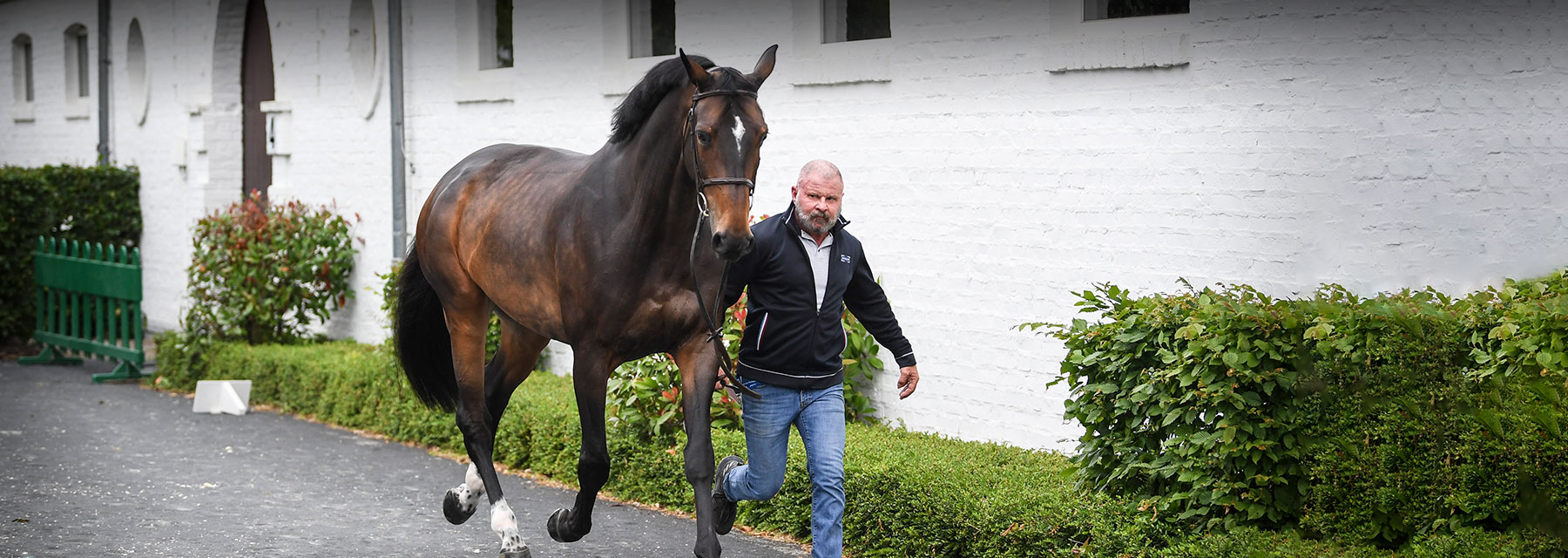For Lee McKeever, It's Not a Job. It's a Lifestyle.
For over 30 years, Lee McKeever has been the head groom, right-hand man and trusted counselor to arguably the most influential modern American show jumper — McLain Ward. An equestrian phenom, Ward has left little to prove in the arena, winning gold medals at the Olympics, the Pan American and World Equestrian Games, topping the Longines FEI Jumping World Cup Finals and being ranked number one in the world. As anyone at that level of competition will say, “it takes a village” of dedicated, organized and highly specialized people behind the scenes to make it to the summit of sport. McKeever has played a pivotal role in every step of Ward’s decorated professional career. With tremendous hard work, dedication, grit and a bit of Irish superstition sprinkled in, Lee McKeever is indispensable to the Castle Hill dynasty and fortunately is not slowing down anytime soon.
Childhood Wanderlust to Team USA
Originally from Dublin, Ireland, McKeever started his love affair with horses when he was 12 years old. He recalls his first experience in the saddle: “I went trail riding with a friend, and the horse ran away with me! So, my dad suggested that I take some lessons.” Even with a tumultuous start that may have had most people steering clear of horses forever, he immediately took to them, amazed by their power and athleticism. While just a boy, McKeever left school to follow what held his heart — horses and travel — and found a way to weave them together as a groom. While he was working at a stable in Ireland, an opportunity arose. A clinician who came out periodically to teach mentioned to McKeever that his friend, Jimmy Doyle, could get Lee a job in America if he was interested. Deciding to try it out for a year, McKeever packed up and headed west. The rest, as they say, is history.
A set of serendipitous circumstances led Lee to the United States, where he met McLain Ward's father, Barney, who hired McKeever to work at the family’s farm, Castle Hill, in Brewster, New York. That was 1988, and McKeever has been working with the Ward family ever since. The work week goes from Monday to Sunday, starting in the morning and lasting until the day is done. At their level of competition, the intensity can be arduous with long hours blending into endless days and countless personal sacrifices along the way. But it is a job that has evolved into a lifestyle that he loves, and McKeever would not have it any other way. “I wouldn’t change a thing,” he says. “It’s never been a job to me. It’s just a way of life.”
As an authority in his trade, McKeever constantly fields questions from other grooms, riders and trainers looking for his opinion or thoughts on all things pertaining to the equine athlete: general prep, gear and equipment, veterinarians, farriers, haulers, rehabilitation recommendations, nutrition and supplements. Because he has been around long enough to see trends come and go and is able to sift through what works and what doesn’t, McKeever is an invaluable source of knowledge not only for the Castle Hill team but for other grooms and horsemen as well. Ward is the first to recognize what an attribute he has in his corner and says, “He knows the horses better than anybody. He knows how to have their conditioning, their health, how to prevent as well as deal with injuries. There’s never been a moment when I doubted that my horses were in anything but the best of care and had the best preparation to compete.” McKeever’s excellence in the industry has always been known but was formally acknowledged when he was crowned Best Groom 2018 at the FEI Awards Gala presented by Longines in Bahrain. Unlike other awards, the winner is determined by vote of the general public along with an expert panel. For a very humble man that would never call attention to himself, being selected by his peers made this award particularly special to him.
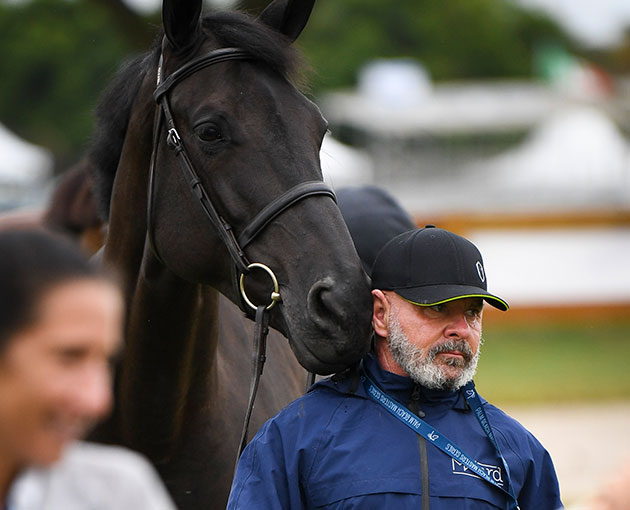
PHOTO BY TAYLOR PENCE/US EQUESTRIAN
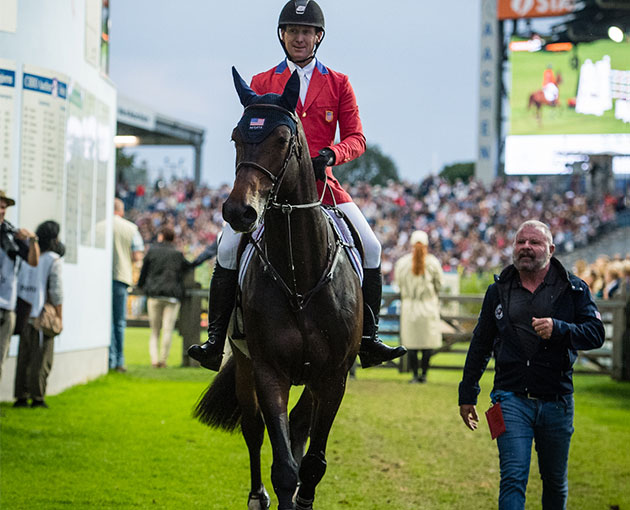
PHOTO BY SHANNON BRINKMAN
Castle Hill Farm groom Lee McKeever’s excellence in the industry has always been known but was formally acknowledged when he was crowned Best Groom 2018 at the FEI Awards Gala presented by Longines in Bahrain. Unlike other awards, the winner is determined by vote of the general public along with an expert panel.
Family Within a Family
Upon noting that Lee’s entire days, nights, weekends and holidays are entirely dedicated to the horses, one might pause to think where a family or personal time might fit in. The answer is simple: Fall in love with a horsewoman who is equally dedicated and industrious. Lee’s wife, Erica McKeever, started working at Castle Hill within a month of Lee’s original start date. She has literally “done it all” for the farm throughout her career, including grooming, riding, hauling horses, prepping for shows, driving tractors and so on. After starting a family, Erica settled into the monumental logistics role as manager at Castle Hill Farm in Brewster, overseeing the more than 30 horses and arranging visits by the farrier and veterinarian, coordinating exercise schedules, tending to horses coming home from shows and organizing those getting ready to leave on the next trailer. Lee and Erica have two children. Their son Bradlee (17) and daughter Baylee (15) were both born and raised at Castle Hill Farm. While Bradlee has found interest in other sports including golf, basketball and baseball, the discipline and hard work shown by his parents’ hands-on approach is an example that is applicable in any sector of competition — and life. Baylee fell in love with the horses early, showing and winning consistently in the pony hunter and equitation rings. She is now continuing that path into the junior hunters and big eq under the guidance of Heritage Farm in Katonah, New York. McKeever is undoubtedly a family man, and when asked how he and Erica make it work with their unique schedules, he says, “We both are supportive of each other. We are able to spend more time together now than ever, since Baylee is showing at some of the same shows as McLain.” Mutual understanding and respect are what make the McKeever family tick, and it carries over into their extended Castle Hill Farm family as well.
Since day one when Barney Ward welcomed him into his family in 1988, McKeever has always felt that the people of Castle Hill are an extension of his own family, and they rely on each other as such. There is unquestionable stress and pressure involved when you are at the very top of the sport. Expectations are high; the bar is continually set higher. While intense circumstances may bring out the worst in some people, the Castle Hill family pulls together and relies on strong teamwork. Because McKeever grew up alongside McLain from a relatively young age, the mutual respect they have for each other is clear. “I wouldn’t be halfway where I am in my career without him. It’s a very special relationship,” says Ward. They have worked side by side for over three decades, a long stretch by anyone’s standards, let alone one set in a fast-paced, high-stakes atmosphere. “We have a good understanding of each other,” McKeever says of Ward. “He allows me to do my job, and he knows I give 100 percent. Really, we both want the same result.” That result would be winning, and the drive to be the best is a significant motivating factor that unites them. Although Ward has accomplished more than what might be on any equestrian’s bucket list, McKeever has one more thing he wants written in the record books: “I would love for McLain to win an individual gold medal at the Olympics.” This is a towering goal, but Ward will likely have the opportunity with the Olympic Games looming near in Tokyo this upcoming summer.
For the Love of the Horse
The sport has evolved over the decades since McKeever started his tenure in the industry. Some changes are for the good, some less so, but for McKeever, at the end of the day, it is all for the love of the horse. “The industry has changed; there is a lot more money involved now. There are so many more shows, which is not always a good thing. But for me it is always about the horses; you must have a love for the horses,” he finishes emphatically. The satisfaction that he receives by seeing horses progress and peak under his care and attention is extremely rewarding. Anyone that cares for horses is familiar with basic husbandry and horsemanship, but as a true maestro of his art, McKeever understands and capitalizes on the nuances within the small echelon of the world’s most elite show jumpers. “The horses are all different; no two are the same — just like people. What is good for one may not work for another,” he says. “Our job is to try and figure out what is best for each one as an individual.” Ward’s father had a significant influence on the system that McKeever and Ward currently use for their program that is based on good work ethic, discipline and, most importantly, room to adapt to the individual horse. As true top athletes, the smallest tweak from one to another can be the desired “edge” or not. This is true in their training and conditioning, show schedules, downtime, as well as their nutrition programs. All of the horses in McKeever’s care have the same basic schedule of grain and hay fed twice daily and chaff at lunchtime. Everyone receives a carrot snack at night check. After that, it depends on the horse, and things are tailored to the individual just as they are with training. McKeever notes that over the years, there has been a definite increase in the quality of feed and supplements being fed to their horses including when they started supplementing with Platinum Performance® products in 2003. McKeever sums it up by saying simply, “With all of the stresses from competing and traveling, using Platinum Performance CJ, Myo-Vet, Platinum BCAA and Platinum Skin and Allergy has played a huge role in our horses’ conditioning and wellness over the years.” Castle Hill relies heavily on keeping their feeding regimen consistent as much as possible during travel, and having a program that can ship around the world with the horses is a must.
Lee McKeever at WEF
Winter Equestion Festival is a Full Day
Although the daily schedule is far from stagnant, a typical day in Wellington brings McKeever to the Palm Beach International Equestrian Center an hour and a half before the first class starts. He rides the horses that are showing in the morning, helping Ward jump some if needed. Then he goes over the day with the rest of the Castle Hill staff and jogs horses if necessary. If time permits, he heads over to FEI and rides those horses early in the day as well. He then meets Ward at the ring to show. Each horse in their care has its own individual person who is in charge of bringing the horse to the ring and taking care of their personal needs. Following those classes, he will go back to the barn as needed if Ward is teaching, or help with horses that are being tried or if the vet is coming. After the long show day is over, McKeever returns to the barn again to help finish the daily chores of dragging the ring, blowing out the barn, feeding and supplementing the horses, and then goes over the schedule for the next day. Night check is at 9 pm; the horses get carrots and have their sheets or blankets put on.
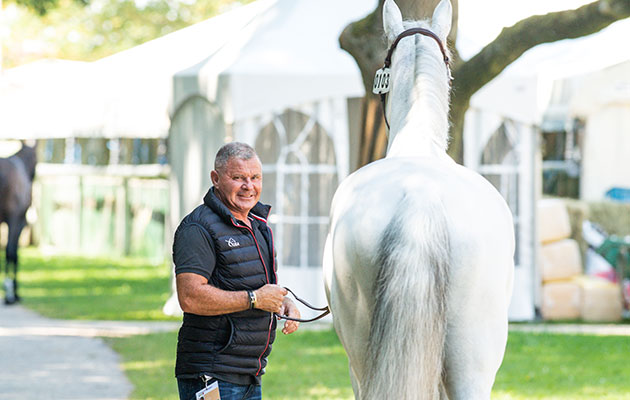
Lee McKeever traveled with McLain Ward and Clinta to the Rio Olympics in 2016.
PHOTO BY SHANNON BRINKMAN
Horses Over the Years
- Clinta — “She is very mellow in the barn at home, but all business at the horse shows.”
- HH Azur “Annie” — “Annie loves her person. She knows she’s special, but she is laid back and happy — a real pleasure to have in the barn.”
- Sapphire “Sara” — “She was kind, sensitive and always tried her hardest for McLain.”
- Rothchild “Bongo” — “He was quirky since the first day arriving at Castle Hill, but he had amazing heart and fight and loved to win.”
Left: Lee McKeever traveled with McLain Ward and Clinta to the Rio Olympics in 2016.
PHOTO BY SHANNON BRINKMAN
The Difference
The horses at Castle Hill await Lee's arrival at daybreak — their heads drape out of stall doors as they gaze toward the entrance, exhaling the chilly New York air. A soft recitation of O Captain! My Captain! hums through the rafters of the barn. The animals are unaware of this great man’s history and respect throughout the industry, and they have no knowledge of the extent of his travels nor the depths of his hard-earned wisdom. They do not know what has shaped this man — the experiences, the triumphs, the defeats. But they know the man he is right now, to them, today. He will walk through the barn doors and spend time with them, day in and day out, caring for them, nurturing them and ensuring that no potential goes left undiscovered. For every morning, each beloved animal will receive the same things: patience, sound judgment and firm direction. They will know what is in store for them that day, for that time in their career that they are in his attentive care has been planned months in advance. His demeanor is calm. They count on it; they thrive on it. The horses trust him absolutely. He knows them inside and out, as individuals, and that is the difference between the good ones and the great ones.

by Emily Smith, MS,
Platinum Performance®
You May Also Like
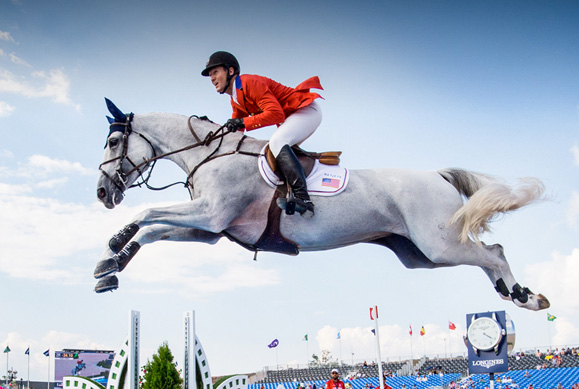
The Science of Sport
The Evolution of How We Treat, Condition & Feed the Competitive Athlete.
Read More
Connectivity: Tendon & Ligament Injuries in the Horse
Leading veterinarians are advancing the science of maintaining and healing tendons and ligaments in the horse.
Read More
Managing Common Muscle Disorders in Horses
Management procedures and specific dietary interventions can help reduce the severity and the frequency of episodes.
Read More about Managing Common Muscle Disorders in Horses